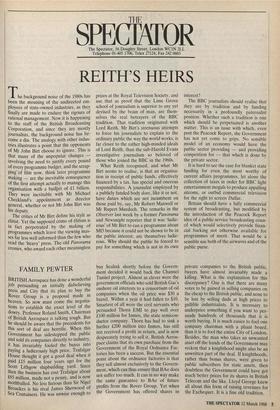FAMILY PEWTER
BRITISH Aerospace has chine a wonderful job persuading an initially disbelieving press and City that its plan to buy the Rover Group is a proposal made in heaven. 5o now must come the negotia- tions to establish the exact level of the dowry. Professor Roland Smith, Chairman of 'British Aerospace is talking tough. But he should be aware that the precedents for this sort of deal are horrific. When this Goyernment has sidestepped the public and sold its companies directly to industry, it has invariably fooled the buyer into Paying a ludicrously high price. Trafalgar House thought it got a good deal when it paid £15 million four years ago for the Scott Lithgow shipbuilding yard. Since then the business has cost Trafalgar about £65 million, made not a penny, and is now mothballed. No less furious than Sir Nigel Broackes is his rival James Sherwood of Sea Containers. He was unwise enough to buy Sealink shortly before the Govern- ment decided it would back the Channel Tunnel project, Almost as clever were the government officials who sold British Gas's onshore oil interests to a consortium of oil companies when the oil price was $30 a barrel. Within a year it had fallen to $10. Smartest of all were the civil servants who persuaded Thorn EMI to pay well over £100 million for Inmos, the state semicon- ductor company. Thorn has had to sink a further £200 million into Inmos, has still not received a profit in return, and is now desperately trying to sell it. British Aeros- pace claims that its own purchase from the Government of the Royal Ordnance Fac- tories has been a success. But the essential point about the ordnance factories is that they sell almost exclusively to the Govern- ment, which can thus ensure that BAe does not suffer too much. It can in no way make the same guarantee to BAe of future profits from the Rover Group. Yet when the Government has offered shares in private companies to the British public, buyers have almost invariably made a killing. What is the explanation for this discrepancy? One is that there are many votes to be gained in selling companies on the cheap to the British public, and none to be lost by selling duds at high prices to gullible industrialists. It is necessary to underprice something if you want to per- suade hundreds of thousands that it is worth buying. It is much easier to fool one company chairman with a pliant board, than it is to fool the entire City of London. Besides, the man who takes an unwanted asset off the hands of the Government may reckon that a knighthood might also be an unwritten part of the deal. If knighthoods, rather than bonus shares, were given to public 'subscribers for state assets, then doubtless the Government could have got much better prices for its shares in British Telecom and the like. Lloyd George knew all about this form of raising revenues for the Exchequer. It is a fine old tradition.


















































 Previous page
Previous page